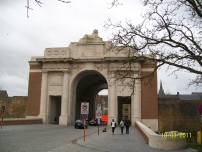| First Name: | Robert | Last Name: | BROWNING | |
|---|---|---|---|---|
| Date of Death: | 23/10/1914 | Lived/Born In: | Camberwell | |
| Rank: | Private | Unit: | Royal West Surrey (Queens)1 | |
| Memorial Site: | Menin Gate, Ypres | |||
Current Information:Born-Camberwell
First Battle of Ypres Between 21st October and 22nd November, 1914 a desperate fight took place around the Belgium city of Ypres, the first of three major battles that were to be fought there during the course of the war. British troops entered Ypres in October. The 1st and 2nd Divisions plus the 3rd Cavalry Division had made their way up from the Aisne as part of the “Race to the Sea”, whilst the 7th Division came west to Ypres after Antwerp had fallen. The Germans knew that Ypres was the gateway to the Channel ports and that these were vital to Britain’s war effort so they poured reinforcements into the area. The fighting fell into three distinct battles; the Battle of Langemarck, 21-24 October, the Battle of Gheluvelt, 29-31 October and the Battle of Nonne Bosschen, 11 November. Ypres did not fall to the Germans but its defence during these two months resulted in the destruction of much of the old regular British Army. From 21st October to 24th October 7th Division, in their position east of Ypres were repeatedly attacked by the numerically superior Germans, whilst 1st and 2nd Divisions were similarly assaulted to the north-east of Ypres around Langemarck. This was the old regular British army at its fighting best and the German offensive failed to break through, but the cost was high. As the result of a large German attack on 22nd October, Kortekeer Cabaret, near Langemarck had been captured and by the next day, 23rd October, a force from 1st Division had been gathered to retake it. Placed under the command of Brigadier General Bulfin, commander of 2 Brigade, it included the 1st Loyal North Lancashire and 2nd King’s Royal Rifle Corps battalions, both of 2 Brigade, along with 1st Royal West Surrey (Queens) of 3 Brigade. Early in the morning three companies of 1st Queens moved forward across the open ground to the right of the road leading to the Cabaret in order to attract German attention. To the left of the road the ground was more undulating and provided more cover. Over this were sent 1st Loyal North Lancashire with 2nd King’s Royal Rifle Corps on their left. The infantry moved across unknown ground in the dark and although 1st Loyal North Lancashire were checked by some wire the whole front arrived together within 200 yards of the German trenches. The Germans were taken by surprise. The three battalions charged and with remarkably little loss and the Cabaret was retaken. 541 British soldiers were released from captivity and 350 Germans were taken prisoner. With the Germans in disarray a further advance was made in which the old Cameron trenches were retaken and another 200 Germans captured. A feeling of elation and hilarity prevailed, but not among the forty or more British soldiers who had been killed. One of these was Robert Browning of 1st Queens. |
||||
| « Back to Search Results | ||||
| If you think any of the information shown here is incorrect, Click Here to submit your amends and comments | ||||




